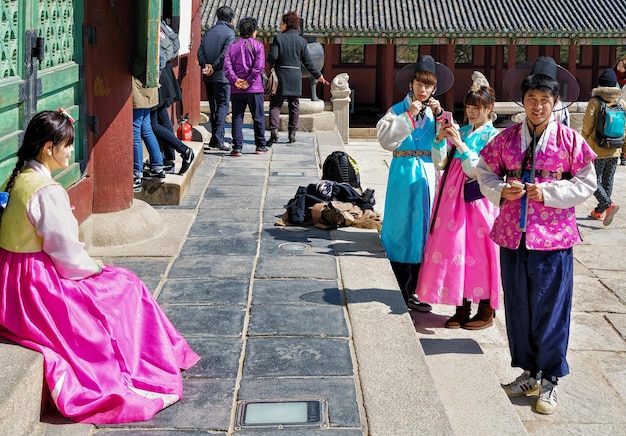Navigating Korean Social Hierarchy: A US Expat’s Guide

Navigating Korean social hierarchy as a US expat requires understanding Confucian principles, age-based respect, communication styles, and etiquette to foster positive relationships and avoid cultural misunderstandings.
Understanding the intricate social dynamics of a new country is crucial for a smooth and enriching experience. For US expats venturing into South Korea, navigating Korean social hierarchy can seem daunting at first. However, with a practical guide, you can learn to appreciate and respect these customs, fostering positive relationships and avoiding potential cultural faux pas.
Understanding the Foundations of Korean Social Hierarchy
Korean social hierarchy is deeply rooted in Confucianism and age-old traditions. Understanding these foundational principles is the first step in successfully navigating this complex system. This section will explore the key elements that shape Korean social interactions.
The Influence of Confucianism
Confucianism emphasizes respect for elders, superiors, and those in positions of authority. This philosophy permeates various aspects of Korean life, from family dynamics to workplace interactions.
Age and Seniority
Age plays a significant role in determining social standing. Older individuals are generally afforded more respect and deference. This emphasis on age extends to professional settings, where seniority is often valued over individual achievements.

Here are some key considerations regarding age and seniority in Korea:
- Proper titles: Always use appropriate titles when addressing someone older or in a higher position.
- Respectful language: Employ honorifics when speaking to seniors.
- Deferential behavior: Show consideration and respect in your actions and interactions.
By understanding the influence of Confucianism and the importance of age and seniority, US expats can begin to appreciate the underlying principles that govern Korean social interactions.
Key Concepts in Korean Social Dynamics
Beyond the basics, several key concepts further define the Korean social landscape. This section will delve into these concepts, offering practical insights into how they manifest in everyday interactions. Understanding these concepts is paramount for smooth social integration.
“Kibun”: Saving Face and Emotional Harmony
“Kibun” refers to a person’s emotional state or feelings, closely tied to their sense of dignity and self-esteem. Maintaining a positive “kibun” is crucial in social interactions, and avoiding anything that might cause someone to lose face is paramount.
“Nunchi”: The Art of Reading the Room
“Nunchi” is the ability to perceive subtle cues and understand the unspoken emotions and intentions of others. It involves observing body language, tone of voice, and the overall atmosphere to navigate social situations effectively.
Collectivism vs. Individualism
Korean society emphasizes collectivism over individualism, prioritizing the needs and interests of the group over individual desires. This cultural value influences decision-making processes and social behavior.
Understanding and respecting these key concepts is essential for successful social interactions. By being mindful of “kibun” and cultivating your “nunchi,” you can navigate complex social situations with grace and sensitivity.

Practical Tips for US Expats to Show Respect
Demonstrating respect is key to building positive relationships in Korea. This section offers practical advice on how to show respect in various social situations, helping you avoid misunderstandings and foster meaningful connections. Remember, a little effort goes a long way.
Bowing Etiquette
Bowing is a fundamental gesture of respect in Korea. Depending on the context and the relationship between individuals, the depth and duration of the bow may vary. A slight nod is generally acceptable for casual acquaintances, while a deeper bow is appropriate for elders, superiors, or formal occasions.
Using Honorifics and Titles
Using appropriate honorifics and titles is crucial when addressing someone older or in a higher position. Common honorifics include “-ssi” (씨) for general politeness and “-nim” (님) for those in positions of authority. Always address individuals by their full name and title whenever possible.
Gift-Giving Customs
Gift-giving is an important aspect of Korean culture, often used to express gratitude, appreciation, or respect. When giving a gift, present it with both hands, and avoid using the color red, as it is associated with funerals. Receiving a gift with both hands shows respect and gratitude.
By following these practical tips, US expats can demonstrate respect and build stronger relationships with their Korean counterparts. Remember, even small gestures of respect can have a significant impact.
Navigating Workplace Hierarchy
The workplace is a microcosm of Korean social hierarchy. Understanding the dynamics of professional relationships is essential for success in a Korean work environment. This section will provide insights into navigating workplace hierarchy with confidence and professionalism.
Seniority vs. Performance
In many Korean companies, seniority is highly valued, and older employees often hold more influence and authority, regardless of their individual performance. This can be a significant adjustment for US expats accustomed to a more meritocratic work culture.
Communication Styles in the Office
Direct communication is less common in Korean workplaces. Instead, indirect communication and subtle cues are often used to convey messages. Learning to interpret these nuances is crucial for effective communication.
Teamwork and Collaboration
Teamwork and collaboration are highly valued in Korean workplaces. Individual contributions are often viewed as secondary to the success of the group. Participating actively in team projects and demonstrating a willingness to collaborate are essential for building strong working relationships.
Mastering workplace hierarchy requires patience, observation, and adaptability. By respecting seniority, understanding communication styles, and embracing teamwork, US expats can thrive in the Korean professional environment.
Dos and Don’ts: Essential Etiquette Tips
Knowing the dos and don’ts of Korean etiquette can help you avoid embarrassing situations and demonstrate your respect for local customs. This section provides a concise guide to essential etiquette tips for US expats.
Dining Etiquette
Wait for the eldest person at the table to begin eating before you start. Hold your rice bowl with your left hand and do not lift it from the table. Do not stick your chopsticks upright in your rice bowl, as this resembles a ritual offering to the deceased.
Public Behavior
Avoid speaking loudly on public transportation. Refrain from blowing your nose in public. Be mindful of personal space and avoid physical contact with strangers.
Social Gatherings
Arrive on time for appointments and social gatherings. Bring a small gift for the host, such as fruit or a sweet treat. Accept drinks offered by elders or superiors with both hands.
Here’s a list of tips for social gatherings:
- Be punctual.
- Bring a small gift.
- Accept drinks with both hands.
By adhering to these essential etiquette tips, US expats can demonstrate their respect for Korean culture and avoid potential social faux pas.
Building Relationships and Overcoming Cultural Barriers
Building meaningful relationships is crucial for a fulfilling experience in Korea. This section explores strategies for overcoming cultural barriers and fostering genuine connections with Korean locals. Embrace the opportunity to learn and grow.
Learning Basic Korean Phrases
Learning even a few basic Korean phrases can go a long way in demonstrating your respect and willingness to engage with the local culture. Simple greetings like “Annyeonghaseyo” (안녕하세요 – Hello) and “Kamsahamnida” (감사합니다 – Thank you) can make a positive impression.
Joining Expat Communities and Social Groups
Joining expat communities and social groups can provide a valuable support system and opportunities to connect with other foreigners who share similar experiences. These groups can also offer insights and advice on navigating Korean culture.
Participating in Cultural Activities
Participating in cultural activities, such as traditional Korean cooking classes, calligraphy workshops, or temple stays, can deepen your understanding of Korean culture and provide opportunities to interact with locals in a meaningful way.
Building relationships requires effort, patience, and a willingness to embrace cultural differences. By learning the language, engaging with expat communities, and participating in cultural activities, US expats can overcome barriers and forge lasting connections in Korea.
| Key Concept | Brief Description |
|---|---|
| 🤝 Respect for Elders | Korean society highly values and respects elders, demonstrating deference in speech and actions. |
| 🤔 “Nunchi” | The art of reading social cues and understanding unspoken emotions to navigate interactions effectively. |
| 🎁 Gift-Giving | Presenting gifts with both hands and avoiding red-colored wrapping or items related to death is important. |
| 🏢 Workplace Hierarchy | Seniority often takes precedence over performance. Respecting superiors is crucial for smooth professional relationships. |
Frequently Asked Questions
▼
“Kibun” translates to a person’s feelings or mood. Maintaining positive “kibun” is essential in interactions to avoid causing someone to lose face or feel uncomfortable. It shows respect and consideration.
▼
Learning even basic Korean phrases can greatly enhance your experience. It demonstrates respect, facilitates daily interactions, and helps you connect more meaningfully with the local culture.
▼
Controversial political issues or sensitive historical events should be avoided, especially in formal settings. Focus on positive and neutral topics to foster good relationships.
▼
Age is of prime importance in Korean culture as it determines how you address and act around someone. People older than you are often more revered, hence you must be ready to show respect to these people.
▼
Always present gifts with both hands showing respect. Avoid items in red color and pick thoughtful gifts based on interests. Some great gift ideas are flowers, chocolates, and items of use.
Conclusion
Navigating Korean social hierarchy as a US expat may seem challenging initially, but with understanding, respect, and a willingness to learn, you can successfully integrate into Korean society, fostering positive relationships, and enriching your overall experience. Embrace the journey and enjoy the unique cultural treasures that Korea has to offer.





